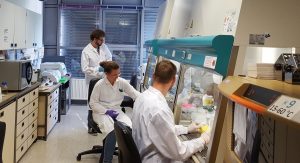Start of the clinical study
The project “Phage4Cure” is about to enter the home stretch: recently, the German Federal Institute for Drugs and Medical Devices (BfArM) and the responsible ethics committee approved the clinical trial that has been planned since the beginning of the project. In this upcoming first-in-man study, the phage compounds produced by the project partners will be tested in humans for the first time – in addition, this is also the first study in Germany in which bacteriophages are administered as part of a clinical drug trial.
The study is being conducted at the Charité in Berlin by Charité Research Organisation GmbH. First, it will be investigated in healthy volunteers how the human body reacts to the administration of phages: like it is known from asthma patients, the phages are inhaled into the lungs using an inhaler. It will then be studied how the immune system reacts to the phages and how long the phages remain in the lung tissue.
If this first phase of the study is positive (i.e., for example, no severe side effects occur in the volunteers), the phage compound will be tested on patients in the next step. The active ingredient is a mixture of three phages (the so-called “phage cocktail”), which were selected because they are specifically effective against the bacterium Pseudomonas aeroginosa. A sputum sample will be tested from patients suffering from chronic colonization with this bacterium. This is to determine whether these patient bacteria are sensitive to the phage cocktail. The patients can participate in the study and will be treated with the phage cocktail only, if it is proven by the lab results, that the phage cocktail could be effective (further inclusion and exclusion criteria apply).
The aim of the testing in patients is not therapeutic treatment or even a cure, but will also serve to assess the safety, tolerability and dose finding of a phage therapy. If this first-in-man study is successful overall (the evaluation will take about one year), further studies are intended (and then hopefully with therapeutic approaches).
The study is expected to start in mid-September 2023. Interested subjects should register on the portal of the Charité Research Organisation GmbH, patients directly on the register page for patients. You will find further information about the upcoming study there as well.
Start of the clinical study Read More »


